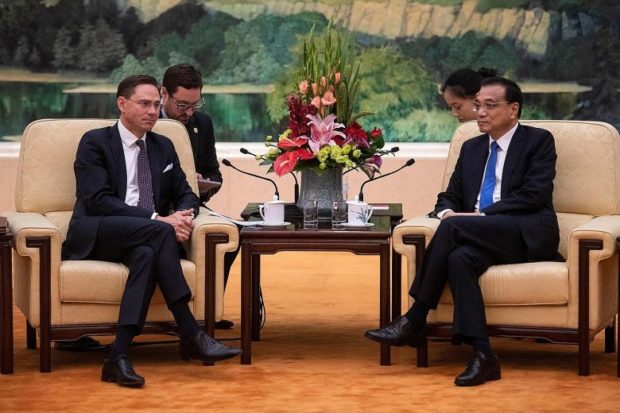
European Commission vice-president Jyrki Katainen (left) and Chinese Premier Li Keqiang in Beijing yesterday. Despite being on the same page about upholding the multilateral trading system, both sides disagreed over creating a level playing field for foreign firms operating in China. AFP
SINGAPORE — China and the European Union have pledged to uphold the multilateral trading system in the face of the United States’ unilateralism, and have agreed to set up a working group to look at updating the World Trade Organization (WTO).
But after an economic and trade dialogue yesterday, differences between the two sides over creating a level playing field for foreign companies operating in China appear to remain wide, with the EU representative admitting that negotiations on these issues will not be easy.
The EU wants issues such as subsidies for state-owned firms and forced technology transfer – which it has labelled as unfair Chinese trade practices – to be addressed in the reform of the WTO.
Mr Jyrki Katainen, the European Commission vice-president for jobs, growth, investment and competitiveness, who led the EU’s delegation at the dialogue, said Washington’s unilateral action on trade showed shortcomings in the WTO.
He was referring to US moves to impose punitive tariffs on EU steel and aluminium as well as imports of Chinese goods. Both the EU and China have retaliated against the US measures.
The US has also taken aim at China because, like the EU, it believes Beijing is using inappropriate means to acquire technology.
“Even though one cannot accept unilateral actions, which violate the principles and rules of the WTO, when a country like the US takes unilateral moves, it tells us that we have to update the WTO to be better suited for the existing environment,” Mr Katainen said at a press conference after the dialogue.
China and the EU have agreed to set up a joint working group to discuss modernising the WTO, he said.
Mr Katainen noted that it will take time to make changes at the WTO, but “it doesn’t mean that countries can’t meanwhile improve their practices”.
He said while the two sides discussed positive issues, they also dealt with difficult ones such as overcapacity, forced technology transfer and cyber security.
The Chinese delegation at the dialogue was led by Vice-Premier Liu He, who stressed that China and the EU had a common interest in defending the global multilateral trading system, media reports said.
“Both sides agreed to resolutely oppose unilateralism and protectionism, and prevent such practices from impacting the world economy and even dragging the world economy into recession,” he was quoted as saying.
Mr Liu also expressed hopes for the EU to take concrete steps to lower restrictions on European exports to China.
The two sides are negotiating an investment agreement and will be exchanging trade proposals at the China-EU summit in Beijing next month.